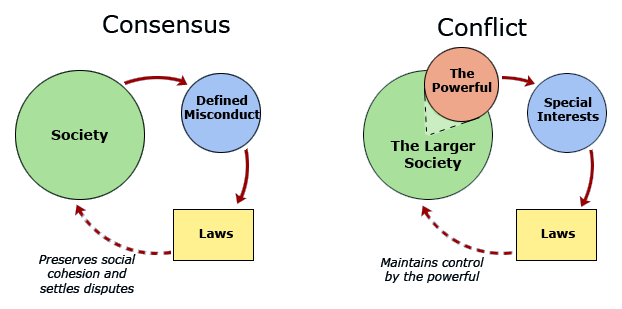Paradigms of Law
There exist two basic points of view on the operation of law in our society: consensus and conflict. The consensus paradigm is allied with the concepts of the famous sociologist, Emile Durkheim. He characterized consensus paradigm as law that has a unifying force in society. As such, that which the consensus of society characterizes as misconduct is classified as crime. He noted that repressive law functions to preserve social cohesion, and that law is an instrument for settling disputes objectively.On the other hand, conflict paradigm portrays law quite differently, falling back on Marxist notions of power. In this way, law is viewed as an instrument of the powerful in society. Laws are created by the powerful for the purpose of maintaining their power. As such, those in power define crime so that it benefits their special interests. This also permits the powerful to use law to define political action of the oppressed in the apolitical language of crime. Pluralism is an adaptation of the conflict paradigm that looks to supply a more intricate statement of the function of law in society. Roscoe Pound held that those in power look to protect their turf. Various groups seek to influence those in law-making positions to protect:
- any threat to their group;
- their social institutions;
- exert their brand of morality on others;
- secure their personal way of life.
As such, particular interest groups in society identify law, and although these interest groups possess power, their power relative to other interest groups will change over time. Examples of this can be seen as the various political parties acquire or loose power after particularly contentious elections.

